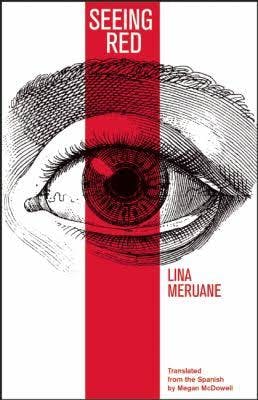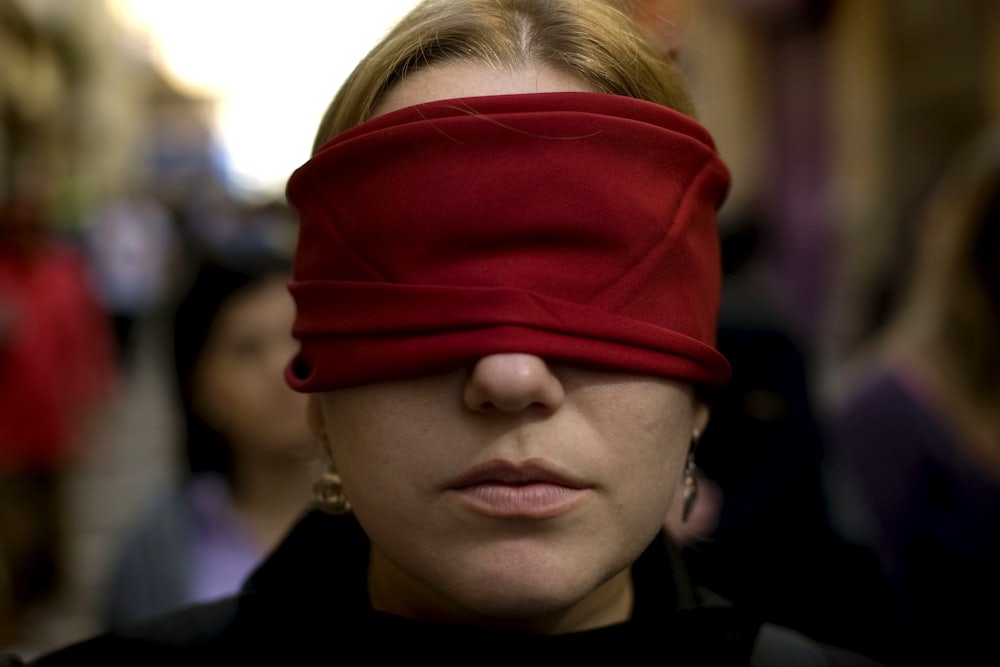In her collection of
essays on learning to be blind, Sight Unseen, Georgina Kleege describes realizing that what is for her
an expanse of green is something that a sighted person would see as a field of
individual blades of grass, perhaps with insects crawling between. Her response,
though, was not envy, but perplexed wonder: “What do sighted people do with all this visual detail?” she
marveled. An expanse of green was her reality, against which a riot of sight felt
excessive, superfluous. For her, the 90 percent of her vision she lost in adolescence was
just one way to describe her visual orientation: “I would rather go to an art
gallery or movie theater than a concert hall,” as she puts it; “although my
eyes are blind, my brain is still sighted … I know what it means to be sighted,
because I live in a sighted world.”

For the sighted, “blindness” is usually a metaphor, an analogy, and a figure of speech; it’s an idea, something you can talk about, or imagine (or imagine that you can imagine). But one-eyed men in kingdoms of the blind, or none so blind as they who will not see, these idioms that transform blindness into an abstraction prevent us from understanding sight. Sight is not something you can see: it’s the one thing you can’t perceive, in fact. Sight is invisible until it disappears.
Lina Meruane’s autobiographical novel Seeing Red begins with the moment she lost her vision, when a blood vessel burst in her eye and her sight came into focus: a blind spot, a migraine, an absence, and a mist of red descending. In the novel, it’s a moment she has long anticipated. Having been born with a congenital weakness in her eyes, her doctors have laboriously described to her the event that will bring her sight to an end, an event which she has filled in with her imagination. She cannot see it, of course; she can only look forward to its inevitability, struggling to defer its inexorable approach. But this life is hardly living. Burdened by warnings and advice, she waits for the moment when the arteries will break by living in denial: She must not hold her breath; she must not cough; she must not lean over; she must not lift. She must not dance. She must not drink. She must not have sex. To see, she must not live. And so she does not.
By contrast, the moment she sees “the most shockingly beautiful black blood I’ve ever seen” is when it is suddenly too late to not do anything. The die is cast; she no longer has eyesight to lose, and will see her own blindness from that point on. But even her doctor cannot see what she can see: As he peers into her diluted pupil (“like he was looking into a keyhole”), he can only make out the same “bloody nothing” that has filled her eyes. And where he sees nothing, she now sees so much, an excessive and overwhelming superfluity that floods the world in red. This is where the novel begins: As her eyes fill up with blood, she begins to see, and live.
Seeing Red was first published in Spanish, in 2012, as Sangre en el ojo (“Blood in the Eye”), winning the Sor Juana Ines de la Cruz prize, among other honors and recognitions. It’s Lina Meruane’s fourth novel. Though she lives in New York, where the novel is set, her voice is new to the Anglophone world, and the book carries the inevitable carte de introducción from Roberto Bolaño on the back cover. (“Lina Meruane’s prose,” he writes, “has great literary force: it emerges from the hammer blows of conscience, but also from the ungraspable, and from pain … one of the one or two greats in the new generation of Chilean writers.”) But we shouldn’t mistake her for an “emerging voice” or anything of the sort; Seeing Red is the triumphant realization of a stunning artistic vision, a novel as black and bitter and bloody (and beautiful) as its central conceit.
Seeing Red is also not—however strange it will sound to say this—a novel about “blindness.” It certainly is a novel about “going blind” (or about the kind of visual impairment which those kinds of phrases might flatten into abstraction). But the novel begins with the moment she doesn’t become blind, when the specter of an abstraction is replaced by a very vital reality. When one of her eyes becomes totally opaque, the other fills with a swamp of blood that shifts and sloshes, but allows just enough light in to see. Her “blindness” is therefore not a negation, but is intensely visual. By the same token, her blindness is not an end but a beginning. The novel begins at this moment because so does her life. A specter of “blindness” is replaced with the reality of living with blood in her eyes… but living.
Life as a blind woman is saturated with experience, overstuffed with a vivid and vital cacophony. Where we might expect a flat expanse of red, the bloody curtain of her blindness exposes a dense texture of experience, a superfluous excess that can be hard to absorb. Without sight to intercept and organize the world as space, the dam bursts; a flood of sound, feeling, smell, temperature, vibration, and tastes, all jostling for attention. Sight creates distance; her blindness closes the gap, and the tactility of the world is aggressive and overwhelming (“What do un-sighted people do with all this sensory detail?” I found myself wondering). The walls catch her hands, and the furniture moves to trip her; bodies collide in space and everything burns or freezes and cuts.
Seeing Red is a rather short book—well fewer than 200 short pages, divided into paragraph-free mini-chapters—but it took me weeks to finish it. Each moment feels like a world, entire and indivisible; I kept putting the book down after spending long minutes on a single page, like I was full and needed time to digest. It was too much and too messy to absorb; I found myself exhausted, and wanted to step back, put the book down, and rest. In part, this is just the riotous fecundity of the writing (which is imbued with remarkable richness in Megan McDonald’s translation); Meruane’s sentences are knotty and raw, meaty and complex.
But perhaps it was also a kind of blindness that this book makes visible: A sighted person can close their eyes to the world in a way a blind person cannot, because they can step back, can watch from a distance. But the protagonist of Seeing Red can never stop moving, can never stop pushing forward, reaching out, and bruising her body on the world. It can be exhausting.
Seeing Red began as a memoir of Meruane’s own experience, and much of it is taken directly from her own life. When I emailed her in early February, she explained that she began by emulating memoirs like William Styron’s Darkness Visible or Sylvia Plath’s The Bell Jar, and tried to stick to the facts. But she couldn’t do it, she said, she could barely even get started; “On page three, I realized that the writing needed to go somewhere else and already was … so I liberated myself from the pains of autobiography.”
Instead, she found herself writing about what happens when we promise unconditional love. I’ll do anything for you, we might say, in a moment of flourishing rhetorical generosity. But what if that promise was taken literally? What if the loved one said “yes?”
“What if the ill were not powerless, but powerful? Those questions were much more interesting to me than the truthful account. Fiction allowed me to take the situation to an extreme and to look into these situations with a raw eye … we romantically blind ourselves with the promise of unconditional love. So I went in that direction at the risk of having readers believe, as they often have, that I am a monster.”
Something monstrous happens when those questions become literal, and as the novel touches the cruelty of being cared for, and the predatory nature of those who are in need. Forced to rely on her partner’s (freely-given) care, the novel’s protagonist “sees red” in an idiomatic, almost carnivorous sense. The blood in her eyes is the need she converts into power over her caretaker, victimizing her boyfriend, the willing victim, Ignacio: His love makes him her willing prisoner, as does his fear that she might leave him if she recovers. But who is the real victim? Who the victimizer?
Seeing Red offers no answers, or judgement, of course; only an unblinking gaze into the abyss. But her exploration of what dependence does to love is harrowing. And as the novel winds to an increasingly torturous conclusion—dead-ending onto a twist I hadn’t anticipated until I was literally reading the words—her blindness becomes a metaphor, at last, for the tyranny of human frailty and need, the strangling hunger of bodies that break and fail, and the whirlpool of our shared mortality.
